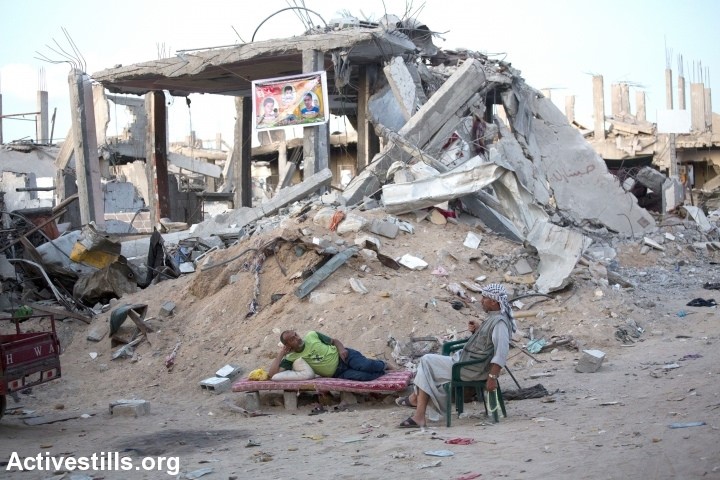Palestinians in Gaza displaced by deadly Israel’s military offensive on the besieged enclave are still waiting for solutions as winter advances. Israel’s military assault left over 110,000 Palestinians homeless and the displaced are traveling from one place to another to find refuge. Muin Bahar, who lives amongst the rubble of his destroyed home, told Ma’an Palestinian news agency that it is difficult to find a place to live, eat or drink.

Palestinians sit in front of destroyed buildings in a quarter in At-Tuffah district of Gaza city, which was heavily attacked during the last Israeli offensive, Gaza city, September 21, 2014. During the seven-week Israeli military offensive, 2,131 Palestinians were killed, including 501 children, and an estimated 18,000 housing units have been either destroyed or severely damaged, leaving more than 110,000 people homeless (Photo: Activestills)
“All we are able to eat is canned food and I do not have a job or money for us and for the kids in schools.” He urged Palestinian authorities to start the rebuilding process before winter arrives. “Soon, we could be sleeping under the rain,” he said.
With indirect talks with Israel suspended until late October, life for Gazans is becoming more difficult by the day, as the necessary materials needed for reconstruction are not allowed entry into the enclave. “The (ceasefire) agreement imposes strict security on the materials allowed into the Gaza Strip and is monitored by Israel,” economist Maher al-Tabba told Ma’an. The reconstruction process also requires obtaining licenses from Ramallah, indicating that Israel does not recognize the unity government. “This way the process will not be serious or quick because the private sector needs licenses from the government in Ramallah for projects and Gaza does not only need rebuilding, but many development projects that were prevented by eight years of the siege,” al-Tabba said.
The July-August Israeli operation in Gaza killed at least 2,100 Palestinians, and the UN said it made some 100,000 people homeless in the long term. The cost for full reconstruction of homes and infrastructure destroyed during the war is estimated at $7.8 billion by the Ramallah-based Palestinian Economic Council for Development and Reconstruction.


